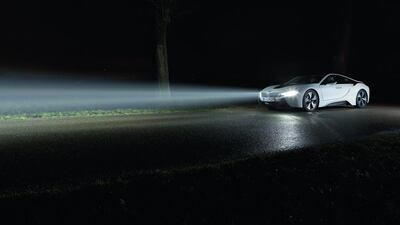Dusk has been and gone and your long day in the office starts to fade away as you take a longer, less direct route home, one that is a more enjoyable drive along a meandering ribbon of black tarmac, as opposed to the fluorescent, conveyor-belt-like motorway route full of commuters.
The surface rises and falls, bends and turns in ways that almost become subconscious, except this time something happens. A thin shaft of light shoots out from your car’s lower dynamic spot lamp and flickers as it locks onto an object as you approach at speed – a small deer grazing beside the road that could dart into your path at any moment.
A scenario without such a warning would have once caused surprise, but swift evasive night manoeuvres can now be dealt with in a much calmer fashion thanks to BMW’s latest NightVision technology, which was showcased to us in the firm’s 7 Series.
Via an onboard infrared camera, mounted discreetly between the fins of the kidney-shaped grilles, the system can detect large animals, such as deer and horses and pedestrians, from up to 100 metres away, even in complete darkness. Should you decide to have the camera view displayed on the central infotainment screen, you will see pedestrians highlighted in bright yellow long before they can be seen by the naked eye. The system can also differentiate animals, highlighting them in brown. If either then enters into a predefined safety zone in front of the car’s path, a warning will appear both in the instrument and head-up display while the dynamic spotlights will illuminate and track the object and, if a potential collision is predicted, an audible warning will also sound.
BMW chose the darkness around its isolated development centre in Munich to demonstrate its new LaserLight technology, which will be appearing first in the new i8 hybrid sports car.
So keen was BMW to show off these new lights that we were brought on passenger rides in the latest i8 preproduction prototypes during a special late-night event. The new technology channels a blue laser light through a reflector, giving the high-beam 10 times higher luminance compared to a conventional light, extending the range to 600 metres, while also being 30 per cent more efficient.
It’s impressive to experience and is noticeably better in comparison to halogen and LED units. That’s once up to speed anyway, as the LaserLight function is only available at speeds above 70kph, which BMW says is because drivers will only need that extended visibility at higher speeds. Not all i8 customers will be able to opt for the new LaserLight system, however, due to country-specific regulations, which mean that it won’t be available in the United States as the lights are brighter than permitted. BMW is also in talks with legislators in China to amend the laws there to allow its introduction.
Laser-powered headlights aren’t the only futuristic-sounding light technology being developed by BMW. Christian Amann, the head of Lighting & Visibility Systems, also unveiled the latest OLED (Organic Light Emitting Diode) system, which he claims will be in series production by 2017. OLED light is generated through semi-conductive layers made from organic materials that are just 0.06 millimetres thick, 150 times thinner than a human hair. These are then hermetically sealed between glass plates or plastic film.
The application of OLED rear lights may be a few years away, but BMW will make its LaserLight system available as an option on the i8 later this year, if not quite in time for the start of the first customer deliveries in June. No official word on price, but it is expected to be high at this early stage.
Then again, for buyers of the stunning i8, price may not be such a concern. Neither will commuting.
weekend@thenational.ae

